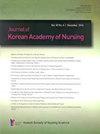在经历过创伤的妇女中促进健康的关怀计划:一项准实验性先导研究
IF 1
4区 医学
Q3 NURSING
引用次数: 0
摘要
本文章由计算机程序翻译,如有差异,请以英文原文为准。
A Caring Program for Health Promotion among Women Who Have Experienced Trauma: A Quasi-Experimental Pilot Study
PURPOSE
Women are more vulnerable to post-traumatic stress (PTS) than men, causing several health problems. Nurses should understand and work with women who have experienced trauma and provide interventions to promote their physical, social, and mental health.
METHODS
This quasi-experimental pilot study used a one-group pre-test/post-test design. Data were collected from 14 women recruited between December 2019 and May 2020 from a self-sufficiency support center in South Korea for sexually-exploited women who had experienced trauma. The program consisted of six one-on-one intervention sessions per week for six weeks. Each session averaged 60~120 minutes. Participants were assessed at pre-test, post-test, and one-month follow-up. Changes in outcome variables over time were analyzed using the Wilcoxon signed-rank and Friedman tests.
RESULTS
The caring program for health promotion was divided into six sessions: understanding the self, sharing traumatic events and negative emotions, reframing the meaning of traumatic events, identifying thoughts and physical and emotional responses, developing health promotion activities, and maintaining a positive attitude during the process of change. As a result of the caring program, PTS (F = 36.33, p < .001), depression (F = 24.45, p < .001), health-promoting behaviors (F = 7.06, p =.004), and self-esteem (F = 19.74, p < .001) among the participants differed significantly at pre-test, post-test, and follow-up.
CONCLUSION
This study provides foundational information for the implementation of a theory-driven program by nurses in clinical and community settings to provide comprehensive care for women who have experienced trauma.
求助全文
通过发布文献求助,成功后即可免费获取论文全文。
去求助
来源期刊

Journal of Korean Academy of Nursing
NURSING-
CiteScore
2.30
自引率
13.30%
发文量
34
审稿时长
4-8 weeks
期刊介绍:
Journal of Korean Academy of Nursing is published using an open access publication model. The journal welcomes original research on nursing intervention and health policies using appropriate research methods. Comprehensive review, concept analysis, and methodological papers are also welcome. The journal has a distinguished editorial board with extensive academic qualifications, ensuring that the journal maintains high scientific standards and has a broad international coverage.
 求助内容:
求助内容: 应助结果提醒方式:
应助结果提醒方式:


